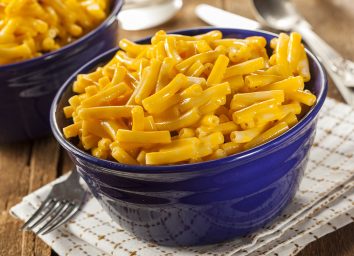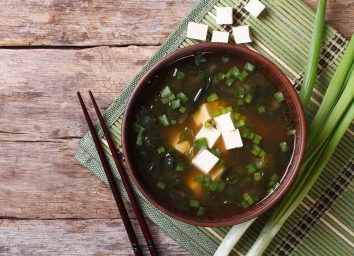The Best Cancer-Fighting Diets
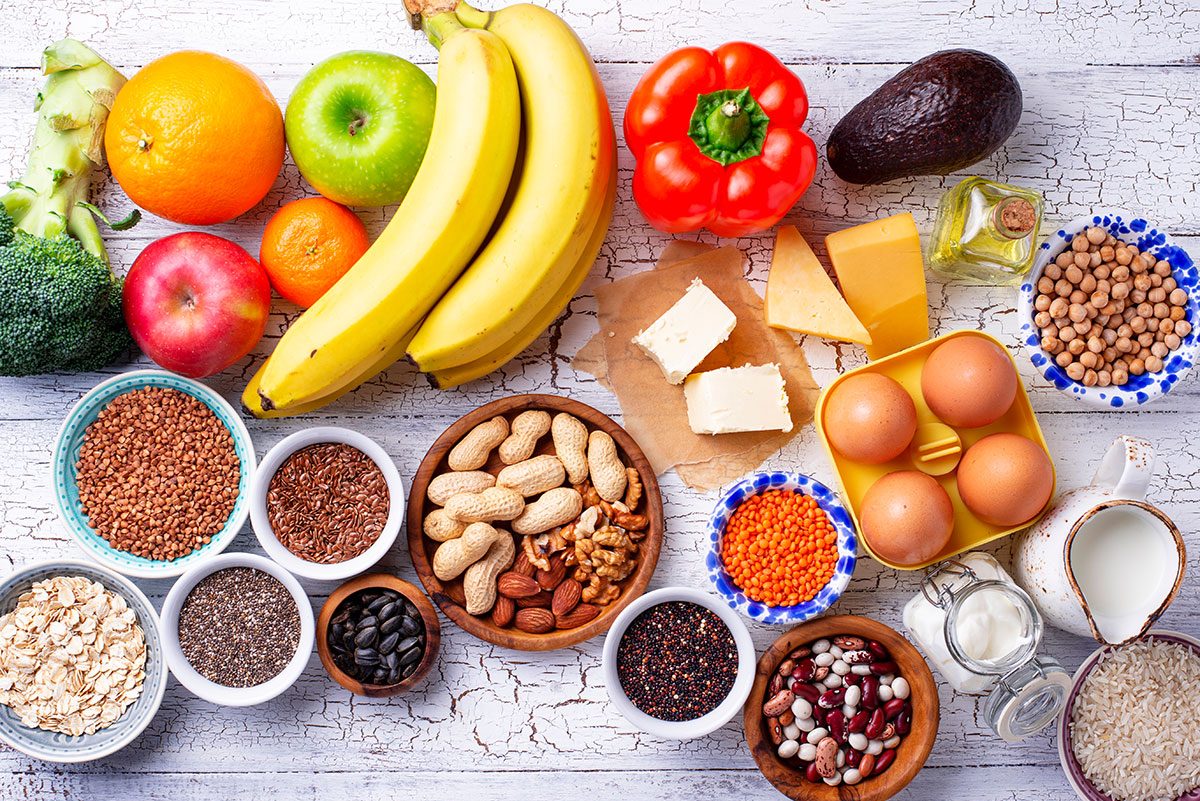
Here’s something to think about: an estimated 40 percent of cancers in the U.S. may just be preventable. And while there are many ways you could actively try to reduce the risk of developing cancer, one of the most prominent approaches to fighting the disease is by making changes in the way you eat so you’re following a cancer-fighting diet.
“Avoiding tobacco, healthful eating habits, regular physical activity, and maintaining a healthy weight are the most important ways you can reduce your cancer risk,” says Karen Collins, MS, RDN, a registered dietitian nutritionist who specializes in nutrition for cancer prevention and heart health. “Diet has potential to influence many stages of cancer development.”
“Healthy eating patterns can reduce DNA damage by supporting antioxidant and anti-inflammatory defenses, influencing carcinogen activation and deactivation and DNA repair,” she says in reference to a 2018 report. “Beyond that, nutrients and natural plant compounds (phytocompounds) and overall calorie balance can influence cell signaling, hormones, gene expression, and immune function that regulate growth, reproduction, and destruction of cancer cells. These nutrients and compounds don’t act alone, but together as part of overall eating habits and overall lifestyle choices.”
Avoiding obesity is also crucial in preventing cancer, as according to the American Institute for Cancer Research (AICR), excess body fat clearly increases the risk of at least 12 different cancers. This includes postmenopausal breast cancer, colorectal cancer, endometrial cancer, esophageal cancer, gallbladder cancer, kidney cancer, liver cancer, mouth, pharynx, and larynx cancer, ovarian cancer, pancreatic cancer, prostate cancer, and stomach cancer.
Collins, who is also a Nutrition Advisor to AICR, emphasized that there isn’t just one approach to eating when it comes to preventing cancer and following an anti-cancer diet. In fact, there are quite a few different eating styles the average person could follow to help reduce the risk of cancer, based on your lifestyle and food preferences.
Here are the 10 best cancer-fighting diets she suggests.
The New American Plate (A Healthy Plant-Focused Eating Pattern)
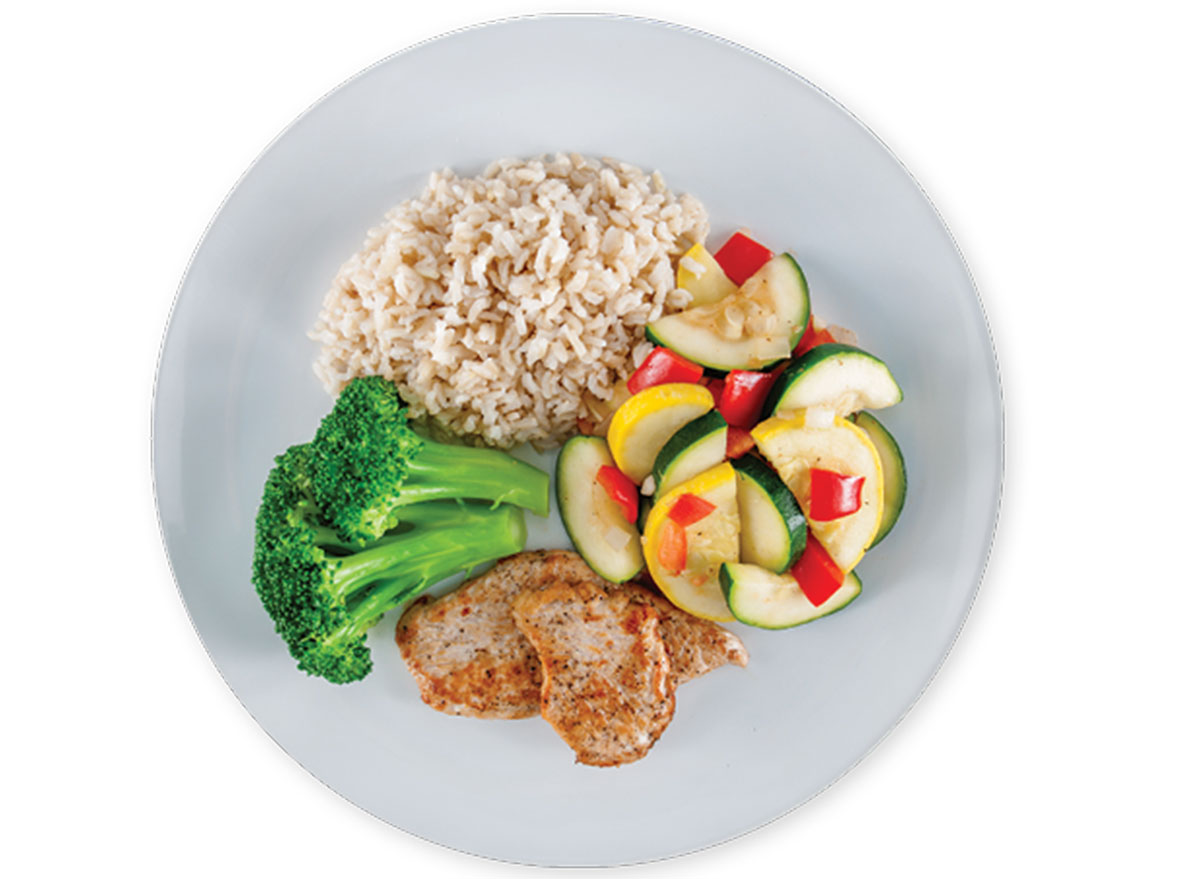
“The New American Plate diet involves healthy choices for the proportion of different foods on your plate and for the portions you eat,” Collins says. “Aim for vegetables, fruits, whole grains, or beans to provide two-thirds (or more) of each meal, with one-third (or less) coming from animal protein. This emphasizes foods that can provide fiber, nutrients and plant compounds that may help protect you from cancer, and limits foods that increase risk of cancer, while helping you reach and maintain the healthy weight that research shows can play a major role in reducing cancer risk.”
Collins additionally notes that in laboratory studies, nutrients and compounds in these plant foods can work to change the expression of tumor suppressors and other genes, and influence cell signaling pathways, inflammation, and self-destruction of abnormal cells.
That said, if you want to include dairy and meat in the diet, it should take up no more than one-third of each meal.
“If you include red meat such as beef, lamb, and pork, limit the amounts to no more than 12 to 18 ounces a week,” Collins says, noting that higher amounts could increase the risk of colorectal cancer. “And be sure that it’s mostly unprocessed red meat. Keep bacon, sausage, salami, and hot dogs to occasional use only.” And why is this? Well, regular consumption of processed meats increases the risk of colorectal cancer.
Cancers especially addressed by the New American Plate include colorectal cancer, breast cancer, mouth/larynx/pharynx cancers, esophageal cancer, lung cancer, stomach cancer, and pancreatic cancer.
Traditional Mediterranean Diet

The traditional Mediterranean Diet is a rather popular topic in the diet world, especially as it has been linked to lower cancer risk.
“Traditional Mediterranean-style eating patterns focus on whole grains, vegetables, and fruits, include beans regularly, and flavor with an abundance of herbs, spices, and garlic,” Collins says. “Most of the fat comes from olives, olive oil, and nuts. Fish is included a few times each week, dairy portions are moderate, and red meats and sweets are used in very limited amounts.”
The Mediterrean diet has also been linked to a lower risk of lung cancer among people who used to smoke, according to a 2016 study. “This is compared to less healthy eating patterns, but it doesn’t show any greater protection than other healthful plant-focused eating patterns,” Collins says. “All these patterns would include an abundance of vegetables and fruits, providing carotenoids, vitamin C, and other phytocompounds that seem to help reduce lung cancer risk.”
The only caveat to the Meditteranean diet is the consumption of red wine, which is not necessarily an element meant to reduce cancer risk. In fact, Collins notes that any reduction in alcohol consumption is actually a step toward lowering the risk of cancer.
“A pooled analysis of 20 studies in 2015 following women from 6 to 16 years found that the increased risk of breast cancer associated with alcohol consumption was no different for wine than for beer or liquor,” she says.
Lacto-Ovo Vegetarian Diet
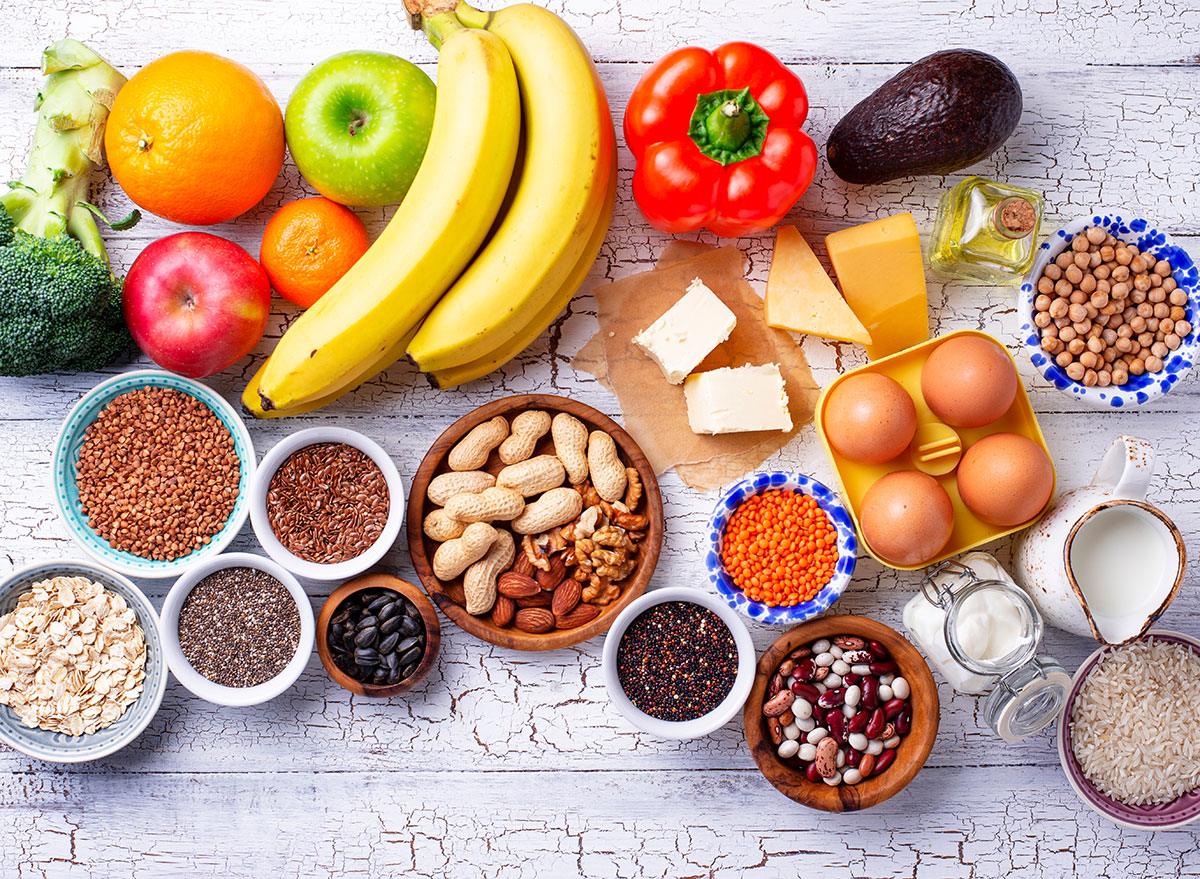
A Lacto-Ovo Vegetarian diet is a plant-based diet in which some animal products, eggs, and dairy are incorporated. So you’re going to want to “include plenty of plant foods like dry beans, lentils, soy foods, and nuts and seeds, since they provide protein along with a different array of vitamins, minerals, and protective phytocompounds,” Collins says.
“Evidence from long-term observational population studies shows that Lacto-Ovo Vegetarian diets are consistently linked to lower risk of cancer compared to diets that include meat and fish more than once a week,” she adds. In fact, in a large U.S. study in 2013, compared to non-vegetarian diets, Lacto-Ovo Vegetarian diets were also linked with lower risk of overall gastrointestinal tract cancers, such as colorectal cancer.
Vegan Diet

Vegan diets focus primarily on an abundance of vegetables, fruits, whole grains, legumes, nuts, and seeds, and are often high in fiber. A vegan diet does not include meat or dairy.
Collins stresses that making the best food choices still matter while following a vegan diet.
“People who avoid all animal-based foods, but include frequent use of sweets, refined grains, sugar-sweetened beverages, and unhealthy choices of added fats do not show as much reduction in cancer risk as people following a vegan diet who limit these foods and include abundant vegetables, legumes (dry beans, peas, lentils, and soy foods), nuts, and seeds,” she says in reference to a 2019 study.
In a 2016 U.S. study, compared to non-vegetarians, men following a vegan diet were 35 percent less likely to develop prostate cancer, a 2016 study showed. But evidence is too limited to allow any conclusions about a vegan diet as a specific choice for reducing prostate cancer risk, concluded AICR’s Third Expert Report.
In the U.S.-based Adventist Health Study 2 in 2016, compared to non-vegetarians, women following a vegan diet showed a trend for lower risk of breast cancer, “but it’s possible that the association occurred by chance or related to other influences,” Collins says. Again, there is not enough evidence to allow any conclusions about a vegan diet as a specific choice for reducing breast cancer risk, concluded AICR’s Third Expert Report.
Pescatarian Diet
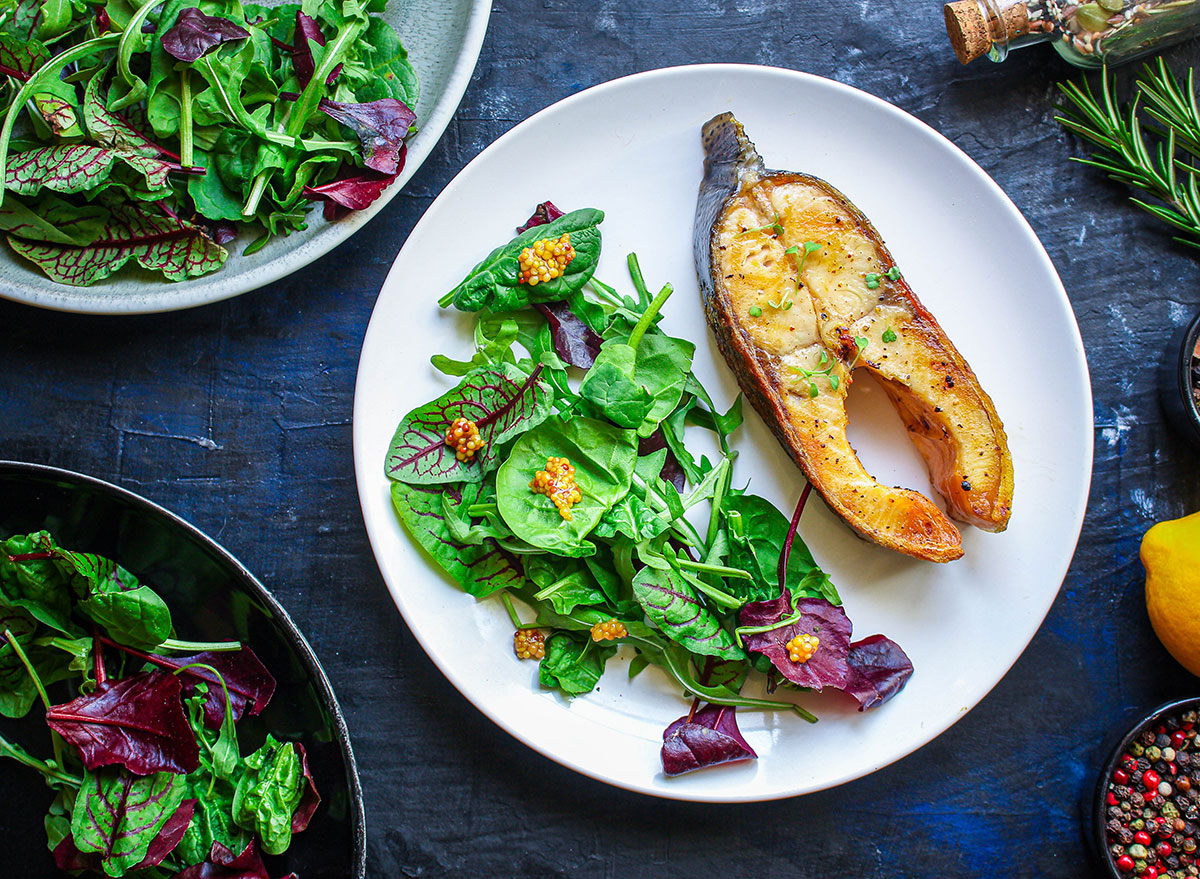
A pescatarian diet is basically a vegetarian diet that also includes fish. So those who follow a pescatarian diet typically consume different types of seafood as well as vegetables, legumes, fruits, whole grains, and other plant-focused foods.
Similar to a Lacto-Ovo Vegetarian diet, evidence from long-term observational population studies show that pescatarian diets are linked to lower overall risk of cancer compared to diets that include meat and fish more than once a week. In a major study of U.S. vegetarians in 2019, pesco-vegetarians showed a particularly low risk of colorectal cancer, even compared to people following other types of vegetarian diets.
“This eating pattern is likely to have higher levels of omega-3 fatty acids (the type of fat found in fish), but so far this type of fat has not been tied to lower cancer risk, so it’s not clear what might explain this association,” Collins says. “Limited evidence suggests a potential association between fish and lower colorectal cancer risk, according to AICR.”
High-Fiber Diet
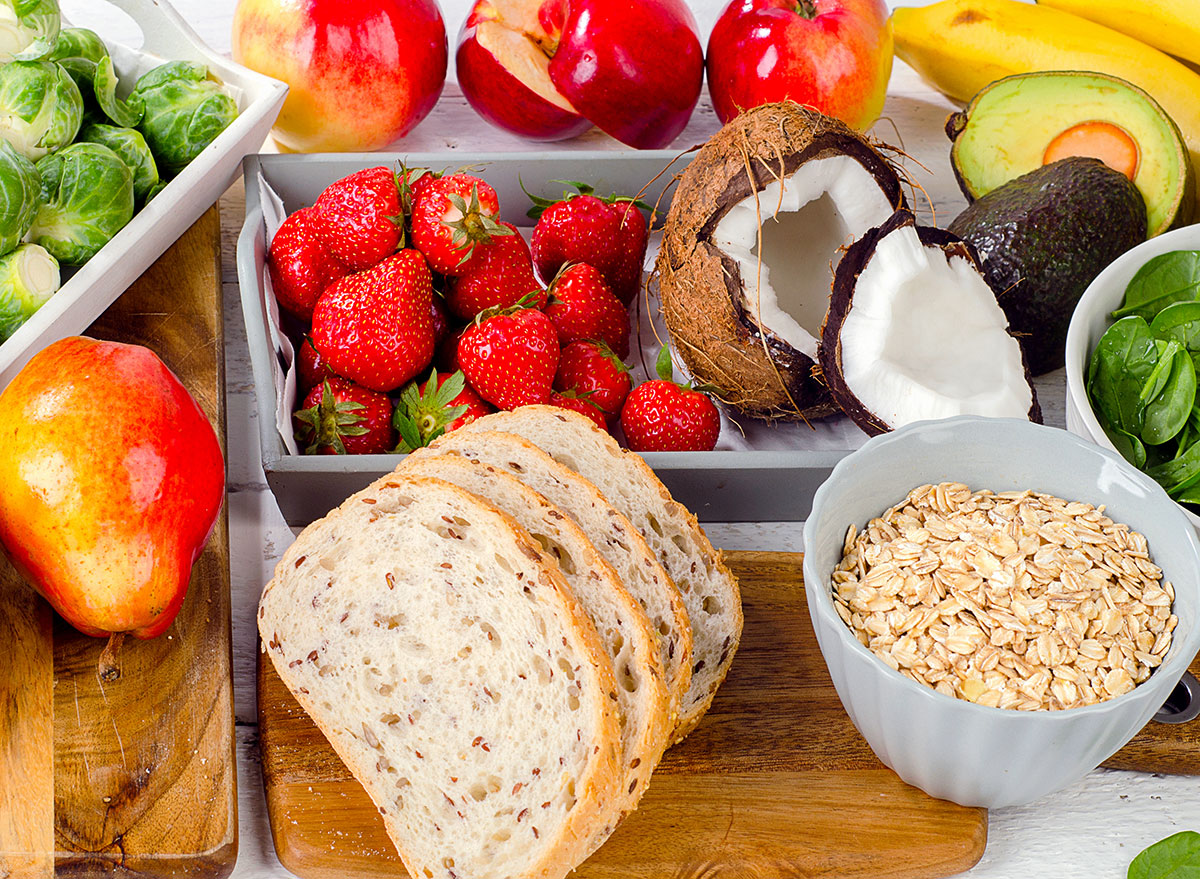
Diets high in fiber include ample amounts of whole grains, vegetables, fruits, legumes like dry beans, lentils, whole soyfoods, nuts, and seeds.
“Dietary fiber may provide protection against cancer in several ways. Some types of fiber provide bulk and help waste move more quickly through the digestive tract, diluting potential carcinogens and reducing their exposure to colon cells,” Collins says. “Other types of fiber support growth of healthy gut microbes and are fermented by bacteria in the colon, producing substances [short-chain fatty acids such as butyrate] that seem to protect colon cells, reduce markers of inflammation and oxidative stress in human clinical trials, and show effects on gene expression that could reduce cancer development.”
Fortunately, high-fiber diets have specifically been associated with the reduced risk of colorectal cancer. “The latest AICR report on colorectal cancer shows lowest risk is associated with dietary fiber of about 30 grams/day or more,” she says, noting that the average person does not consume that much fiber. “The average U.S. adult gets only 17 grams/day, so for most people increasing fiber consumption will be protective, and any increase will contribute to lower colorectal cancer risk.”
A high-fiber diet has also been linked with less weight gain, overweight and obesity per the AICR, so it could help reduce risk of adiposity-related cancers. “High-fiber diets most likely support reaching and maintaining a healthy weight because of how they promote satiety (making it easier to limit calories without going hungry), but could also involve metabolic or hormonal influences,” Collins says.
Veggie Variety Diet (A Diet Heavy on a Variety of Vegetables)
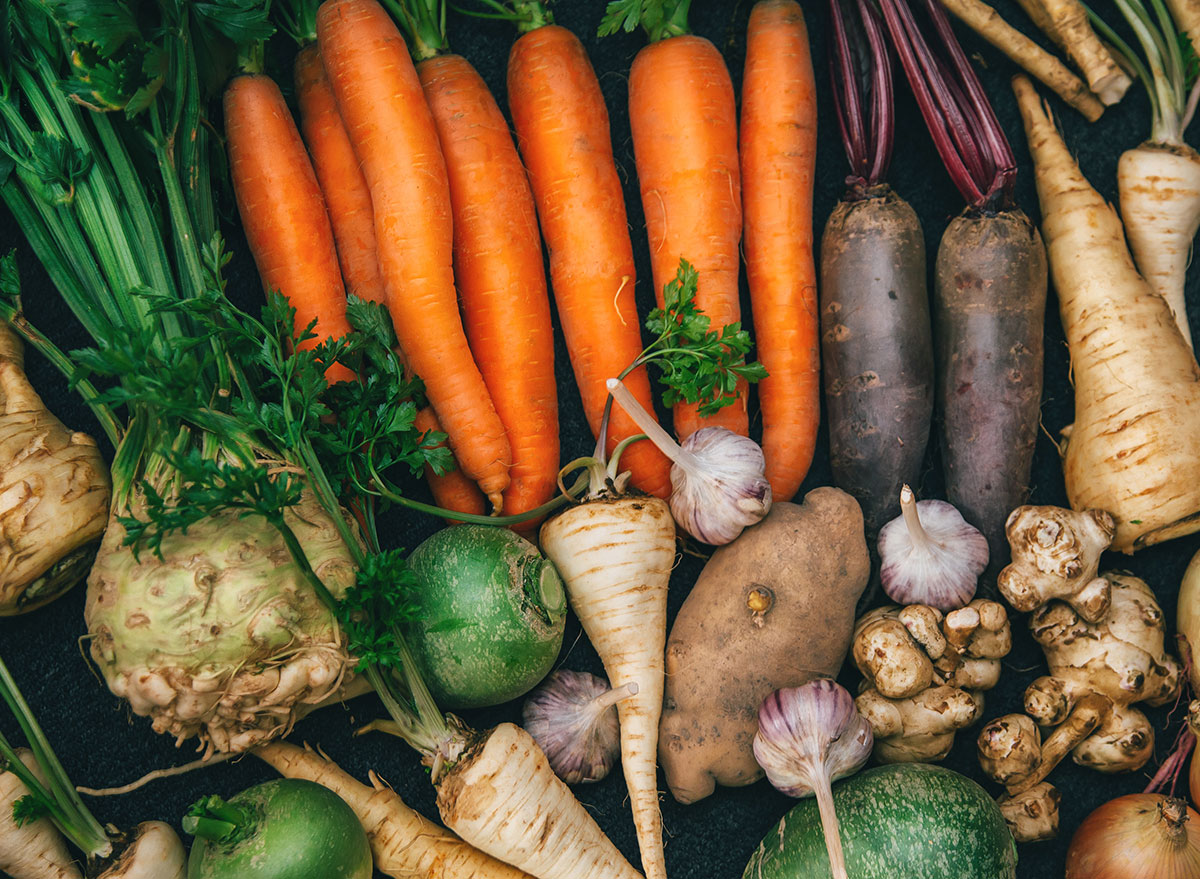
Simply put, those who eat more vegetables have a lower risk of a wide range of cancers, a 2019 study concluded.
“This probably reflects combined protection from the many different nutrients and compounds they contain,” Collins says. “A cancer-fighting diet includes at least five servings of vegetables and fruits each day, and once you have that habit established, including more will help reduce cancer risk even further.”
According to a recent AICR report, eating more non-starchy vegetables decreases the risk of colorectal cancer because they increase the consumption of dietary fiber, and other aerodigestive cancers (esophageal; mouth, pharynx and larynx; lung; and stomach cancers). In addition, limited evidence suggests that non-starchy vegetables may reduce the risk of Estrogen receptor-negative (ER-) breast cancer and bladder cancer, Collins explains.
Vegetables that are rich in carotenoids (beta-carotene, alpha-carotene, lycopene, lutein, and zeaxanthin) like asparagus, sweet potatoes, carrots, broccoli, spinach, tomatoes, and more, have been linked to reduced risk of lung and estrogen receptor-negative (ER-) breast cancers.
“Carotenoids act as antioxidants themselves and stimulate the body’s own antioxidant defenses, decreasing free radical damage to DNA that can lead to cancer,” Collins says. “Beta-carotene and lutein promote cell-to-cell communication that helps control cell growth, increase carcinogen-metabolizing enzymes, and stimulate self-destruction of abnormal cells.”
Vitamin C-rich vegetables like peppers, parsley, kale, broccoli, cauliflower, and more have been linked to reduced risk of lung cancer in smokers as well as colon cancer.
“Vitamin C is also a powerful antioxidant. In lab studies, it protects cells’ DNA by trapping free radicals, and it helps renew the antioxidant ability of Vitamin E” she says in reference to a 2019 review. “In cell studies, vitamin C also inhibits formation of carcinogens and supports the immune system.”
Cruciferous vegetables like broccoli, Brussels sprouts, cabbage, and cauliflower have also been linked to a reduced risk of breast cancer, though more research is needed.
“Cruciferous vegetables provide glucosinolates compounds that are broken down into isothiocyanates (such as sulforaphane) and indoles,” Collins says. “In laboratory studies, these compounds decrease inflammation that could cause cell damage leading to cancer. They also inhibit enzymes that activate carcinogens and stimulate enzymes that deactivate carcinogens. These compounds turn on tumor suppressor genes, slow abnormal cell growth and stimulate self-destruction of abnormal cells.”
Low Glycemic Load Diet
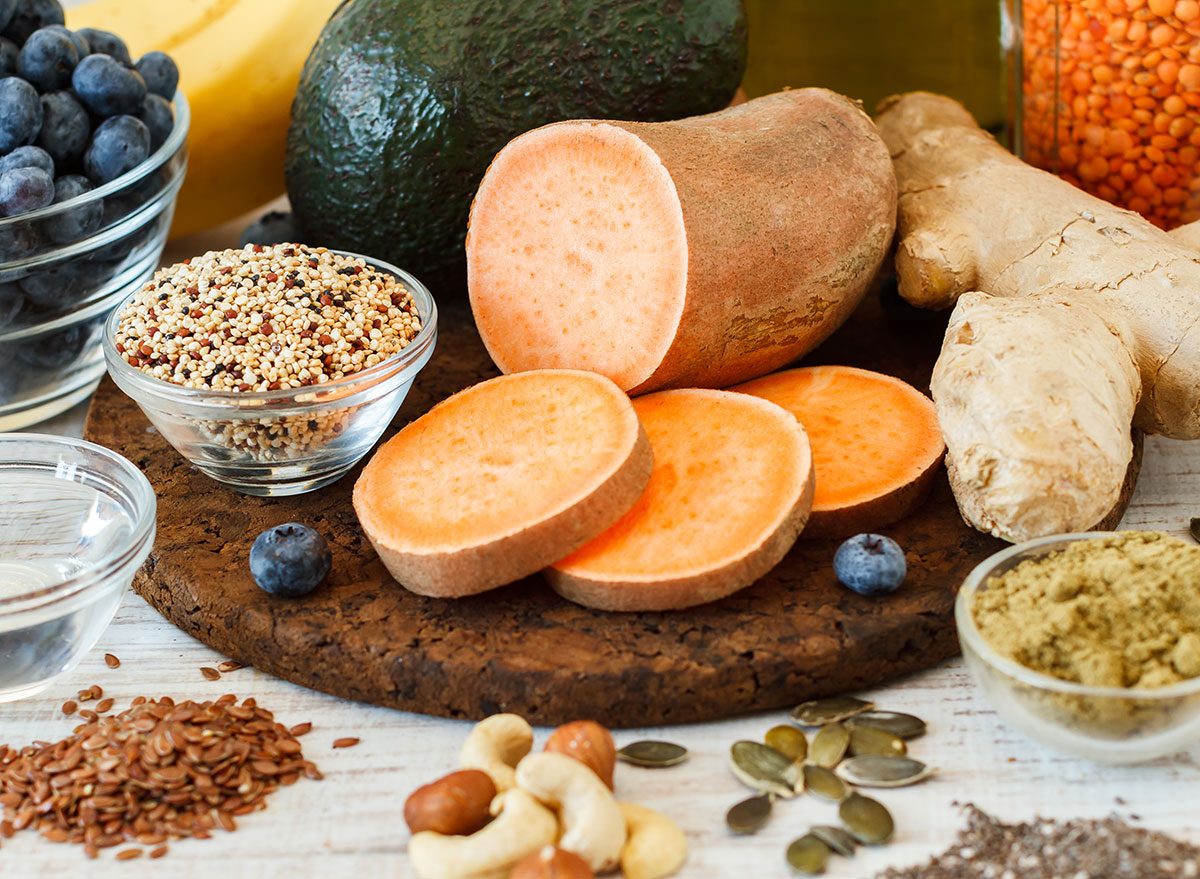
Collins explains that a low glycemic diet includes high-fiber, whole plant foods like whole grains, vegetables, fruits, and legumes in portions appropriate to your needs. However, limiting amounts of refined grains and highly processed foods and avoiding sweets and sugary drinks is key.
“A diet with a low glycemic load is one that avoids rapid increases in blood sugar after eating that trigger increased levels of insulin and related growth factors that can promote growth and reproduction of cancer cells,” she says. “An international consensus summit on carbohydrate quality in 2015 concluded that diets with a low glycemic load likely improve insulin sensitivity and reduce markers of inflammation. This is one example of why it’s important to avoid grouping all carbohydrate-containing foods together, and consider the type of carbohydrate and the overall quality, portion, and balance of carbohydrate-containing foods.”
She pointed out that even if people are eating a low-glycemic load diet, specific food choices still matter.
“Foods that create a low glycemic load diet tend to be high in fiber, nutrients, and protective plant compounds. But diets similar in glycemic load can be very different in cancer protection,” Collins says. “For example, diets low in carbohydrate from whole plant foods and high in processed meats do not provide the nutrients, fiber, or phytocompounds recommended for reducing cancer risk, and may even raise risk. By including appropriate size portions of vegetables, fruits, whole grains, and beans throughout the day, your diet will be low in glycemic load. Low glycemic load explains one part of how these foods contribute to health.”
Analysis for the AICR Third Expert Report, unfortunately, found that diets with high glycemic load increase risk of endometrial cancer, so a low glycemic load is preferred.
Savvy Drinks Diet

Making smart choices about the beverages you drink can play an important role in reducing the risk of developing cancer. For starters, coffee (whether regular or decaf) reduces the risk of endometrial cancer and liver cancer, the World Cancer Research Fund/American Institute of Cancer Research found.
“Human intervention trials and observational population studies suggest that this may stem from phytocompounds in coffee supporting antioxidant and anti-inflammatory defenses against cancer, and could also [be] related to improved insulin sensitivity and reduced circulating levels of insulin,” Collins says.
The expert recommends watching how you drink coffee though, as including whipped cream, sugary flavorings, or chocolate could add more calories than you realize and promote unnecessary weight gain.
Similarly, sugar-sweetened drinks like soda, lemonades, iced teas, and other juices should be limited when talking about reducing cancer risk. “Limiting sugar-sweetened drinks is one of the AICR Cancer Prevention Recommendations because they increase [the] risk of weight gain and unhealthy levels of body fat that are linked with adiposity-related cancers,” Collins says.
Alcohol should also be avoided, or at least limited, to help reduce cancer risk. “Cancers most clearly linked to alcohol are breast, esophageal, colorectal, liver, and laryngeal cancers,” Collins says, while reiterating that “any reduction in alcohol consumption is a step toward lower risk of cancer.”
DASH Diet
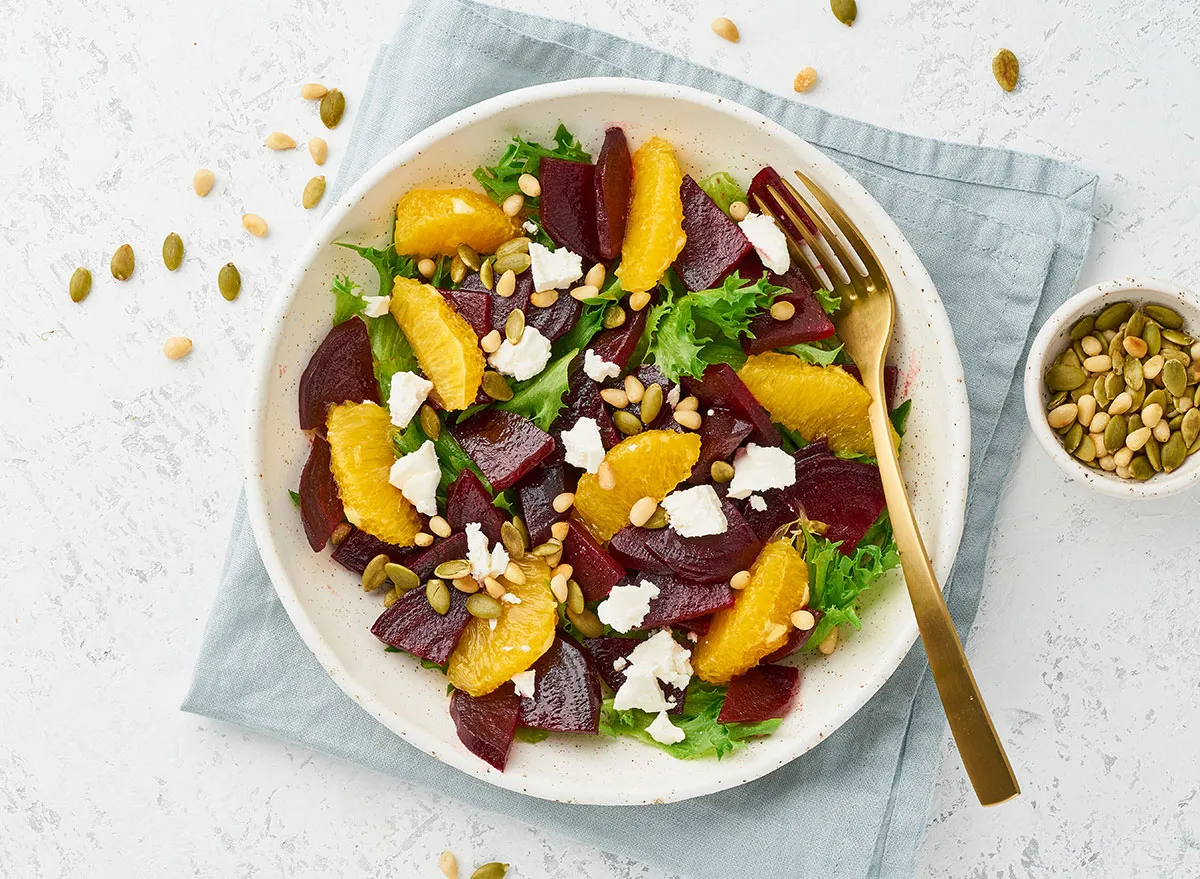
The DASH diet is a plant-focused diet that includes whole grains, vegetables, fruits, legumes, nuts, and low-fat dairy products. Meanwhile, the diet limits high-sodium processed foods, like red and processed meats, sugar-sweetened drinks, and sweets.
“This diet was developed as a way for eating habits to help prevent and control high blood pressure, and research since then has resulted in it becoming one of the eating patterns recommended for reducing risk of cardiovascular disease,” Collins says.
Although there’s still limited evidence, in two large U.S. prospective cohort studies, a higher DASH diet score was linked with a lower risk of colorectal cancer.
“This makes sense since this style of eating includes higher amounts of dietary fiber, vegetables and fruits, and dairy products (and therefore calcium),” Collins says.
And if you’re looking to really stock up on plenty of good-for-you food, check out this complete list of the healthiest foods on the planet.

